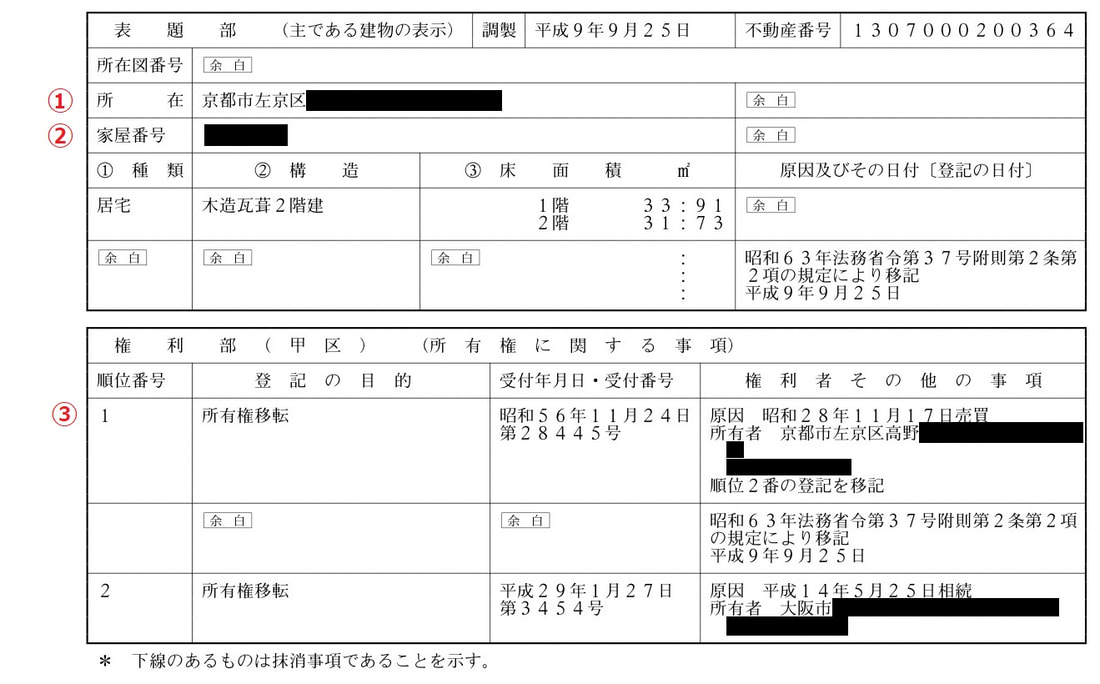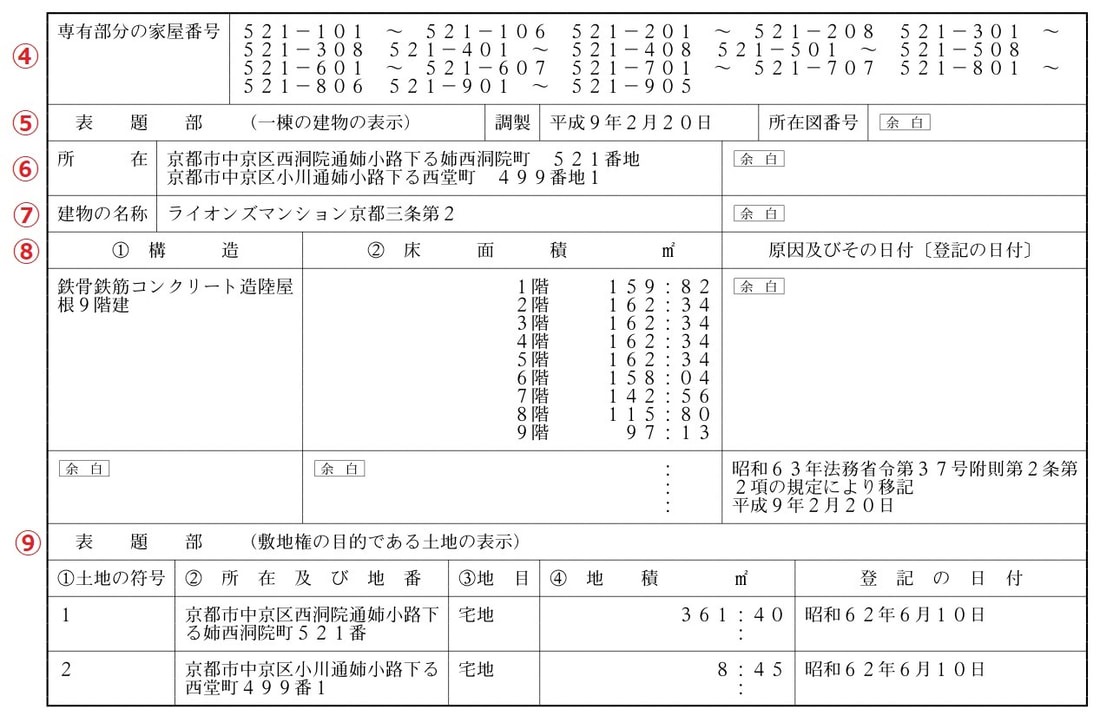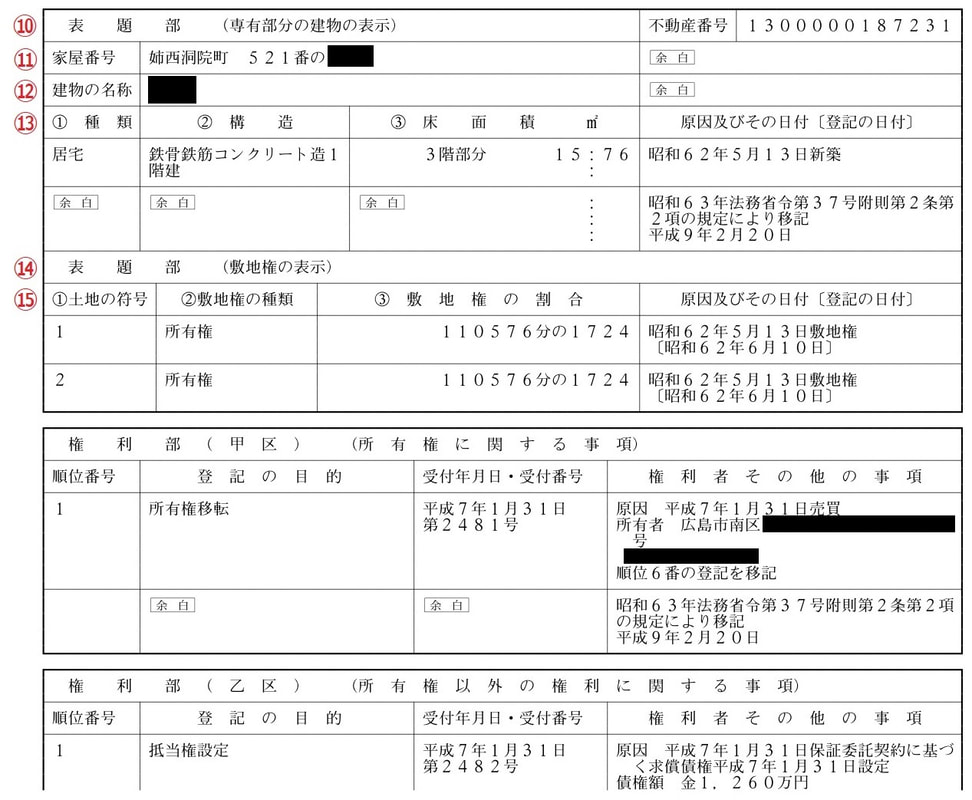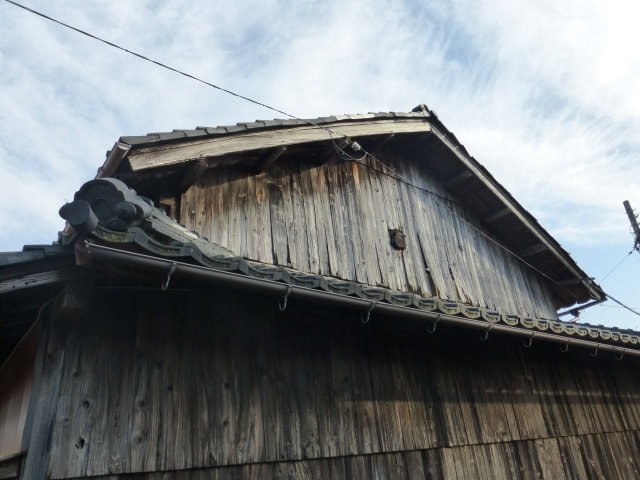|
Today, we will talk about the information on the building registration certificate. The first is a copy of the registration certificate of a wooden 2-story building, and the second is an explanation of the registration certificate of a condominium. First of all, it is a case of a two-story wooden detached house. The content is similar to the land, only the content of the title part is different. ① Location: Location of the building; xxx Town, xxx ward, Kyoto City ② Housing number: #xxx ②-① type of building: residential, apartment, dormitory, store, etc. ②-② structure: structure of building, type of roof (shape of roof) and stories of building ②-③ floor size: floor size of each floor, in ㎡ unit ③ Right Department (Section A) (matters related to ownership): Order of registration, purpose of registration, date of receipt, right holder and other matters. (Reason for registration, owner's address, owner's name) *If there is an underline, the content has been changed and the registration has been deleted. As mentioned above, there are many items that are similar to land, and the Section A (matters related to ownership) and Section B (Matters related to rights other than ownership) of the Rights Department have the same contents. Now, let's check the building registration certificate of the apartment, even though it is the registration certificate of the same building. In the case of a condominium, unlike a detached house, there is an indication of a single building, an indication of an exclusive building, and a further indication of the right of site. Please see below.
④ The house number of the unit (the lot number and the room number of the entire condominium are listed). ⑤ Title section (display of one building) ⑥ Location: Address and lot number of the land where the building is located. ⑦ Name of the building: condominium name ⑧-① structure: structure of building, type of roof (shape of roof) and stories of building ⑧-② floor size: floor size of each floor, in ㎡ unit ⑨ Title section (Display of land, which is the purpose of site right) ⑨-① Land code: Number starting from 1 ⑨-② Location and lot number: Land address, lot number ⑨-③ Classification of land category: Type of land (residential land) ⑨-④ Acreage: Size of land ⑩ Title Section (Indication of Building in Exclusive Area) ⑪ House number: town name + house number + room number ⑫ Building name: Room No. ⑬-① Type: Residential, etc. ⑬-② Structure: Structure of the building, number of floors in the exclusive portion (1 floor) ⑬-③Floor area: Number of floors, size of inner room ⑭Title section (display of site right) ⑮-① Land code: Number starting from 1 ⑮-② Type of site right: ownership, leasehold right, etc. ⑮-③ Ratio of site right: ○○/○○○ (unit size of proprietary wall core/square meter of entire site) As mentioned above, the contents of the building registration certificate are also very different between detached houses and condominiums. Generally, land for condominiums has a land right, and if you purchase the exclusive part of the building, you will also get the land right as a set. The reason why the land is set is to prevent the building and the land from being purchased separately, and to reduce the complexity. If you have any questions, please contact us individually. Today is the case of buying real estate, and is the story of the case where the property you are concerned about is found.
There are several ways to look for real estate to buy in Kyoto, including browsing real estate search sites, asking a real estate agent to suggest a desired property, and finding a property by chance while walking around the city. In the midst of all of this, today's story, can you buy the real estate that you found while walking in the city? When you come to Kyoto for sightseeing, have you ever wondered Is this house empty? No one lives there? And then, have you ever wondered What? Maybe we can buy this house? For example, if the person next door came out, don't you want to ask Does anyone live in this house? For example, if you find the tape on the post and find someone is carrying out luggage, don't you like to talk to them? For example, when you find the property which seems nobody lives because there is garbage scattered around the entrance, have you ever thought Oops! can I buy this? From the conclusion, it is impossible. Unfortunately, even if it's a vacant house or no one is using it, even you knock on the door and ask does anyone live here? or ask do you want to sell it?, they won't say Yes to you, they won't sell it. Until the real estate goes on the market, twists and turns, it will continue to change with the property for sale beyond many stages. First, as an example, vacant homes receive many letters every month from real estate agents. A letter is sent every month to the owner's address, by checking the home address from the register, and by dropping directly on the vacant property. They receive letters from many companies, from large and small, and not just one contractor. And they get letters from a lot of real estate agents, even in the real estate where it's currently residing. This means that a real estate agent who wants to conduct real estate sales brokerage will walk around the city every day, wearing out the soles of his/her shoes, throwing out letters when he or she finds an empty house, and sending out monthly letters when they finds the owner. So, before you find the property, many professional real estate agents make sales pitches again and again that We'll sell high, We'll buy, We'll find the Buyer, and so on. And to say that if the property is not yet on the market is to say that the owner doesn't want to sell the property. If you decline for another reason, the descendants who inherited the property are not yet ready to sell it. If the parents die, the child will own the property through inheritance. If the property is vacant, then yes, the child has a separate estate and has no plans to use the property. Maybe he/she'll put it up for rent. However, this is not a very realistic case, as it would require renovation costs. Many Japanese people inherit real estate from their parents and keep it intact for two to six years. This is because there are cases where the real estate is disposed of after waiting for the thoughts of the ancestors, the 3rd anniversary of death, and the 7th anniversary of death. This is still a good thing, but if there is more than one heir and the heirs are in trouble with each other, it will be impossible to buy it in the first place. When real estate compares the state in which the old house is located with the state of the vacant land, the property tax will be cheaper if the old house is located. Therefore, it is more convenient as an heir to leave it as it is if it is necessary to pay the tax even if the old house which is not used is left unattended. Next time, I'm going to tell you why real estate agents want to do a sales brokerage. |
Details
AuthorArrows International Realty Corp. Archives
June 2023
Categories
All
|




 RSS Feed
RSS Feed